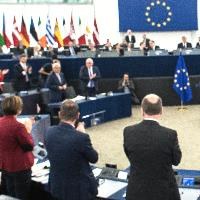(STRASBOURG) – Britain’s departure from the European Union in March 2019 would be “a very sad and tragic moment in our history”, said EU Commission president Jean-Claude Juncker Wednesday, and they will regret it.
Mr Juncker was delivering his annual speech on the State of the European Union to the European Parliament. He said the EU would “always regret this”, as he suggested would the UK. But the EU had to respect the will of the British people, he said, and the EU would “will move forward, because Brexit is not the be-all and end-all”.
The annual speech to MEPs takes stock of Europe’s current political and economic landscape. It is an opportunity to review the work of the EU over the past year, and to look ahead to the priorities of the coming year.
This year’s speech was accompanied by adoption by the EU executive of concrete initiatives on trade, investment screening, cybersecurity, industry, data and democracy, putting words immediately into action.
A series of factsheets published expand on some of the key elements touched upon in president Juncker’s speech.
The state of the Union’s economy was improving, he said, with the fifth year of economic recovery reaching every single Member State. He said growth in the EU stands above 2 per cent for the Union as a whole and 2.2 per cent for the euro area – outstripping that of the United States over the last two years.
Unemployment, he said, was at a nine year low, and almost 8 million jobs had been created during his tenure: “With 235 million people at work, more people are in employment in the EU than ever before.”
Mr Juncker said his Commission could take credit for the European Investment Plan, which triggered EUR 225 billion worth of investment so far, granting loans to over 445,000 small firms and more than 270 infrastructure projects. It also could take credit, he said, for having brought public deficits down from 6.6% to 1.6%, “thanks to an intelligent application of the Stability and Growth Pact.”
“The wind is back in Europe’s sails,” Mr Juncker told the MEPs: “Now is the time to build a more united, stronger and more democratic Europe for 2025.”
On priorities for the year ahead, Mr Juncker singled out strengthening the European trade agenda, saying partners across the globe were “lining up at our door to conclude trade agreements with us.” The Commission was proposing today to open trade negotiations with Australia and New Zealand. He proposed a new EU framework for investment screening: “If a foreign, state-owned, company wants to purchase a European harbour, part of our energy infrastructure or a defence technology firm, this should only happen in transparency, with scrutiny and debate”.
A new Industrial Policy Strategy would “help our industries stay or become the world leader in innovation, digitisation and decarbonisation.”
He promised the Commission would shortly present proposals to reduce the carbon emissions of Europe’s transport sector.
The Commission would also continue its battle to “better protect Europeans in the digital age”, he said, and there would be new efforts to combat cybersecurity, including posing new tools, including a new European Cybersecurity Agency.
Mr Juncker ended his speech by producing his roadmap for “a more united, stronger and more democratic Union”.
“For me, Europe is more than just a single market. More than money, more than the euro. It was always about values,” he said, specifically, the values of “freedom, equality and the rule of law”. There was no place in his vision, he said, for second class citizens, second class workers or second class consumers.
Finally, looking forward to building a more united, stronger and more democratic Union, Mr Juncker ruled out EU membership for Turkey ” for the foreseeable future”, saying “journalists belong in newsrooms not in prisons”.
Roadmap for a more united, stronger and more democratic Union



